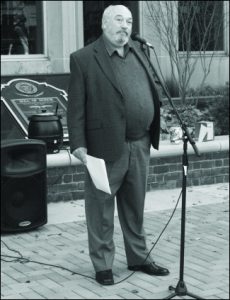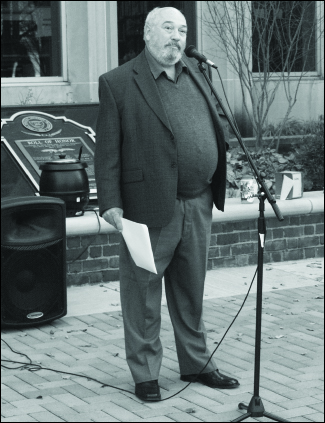
and Taylor Stout
Transcript Correspondent
and Reporter
While Armistice Day may be a single day of the year, the effects of war are felt daily. The goal of Armistice Day is not to glorify war or justify conflict, but it is about recognizing and appreciating the sacrifices made by those who have served and are still serving.
On Nov. 9, OWU students, faculty and staff recognized Armistice Day near the war memorial plaques outside Beeghly Library. The plaques list the names of OWU alumini who have died in war.
Speakers at the event were Shari Stone-Mediatore, professor of philosophy, Chaplain Jon Powers, junior Erika Nininger, Jim Underwood, adjunct professor of journalism and a Vietnam War veteran, and 2011 alumni Matthew Jordan.
Nininger planned the event as part of her independent study with Stone-Mediatore. Nininger said the event started as a way of acknowledging the plaques outside Beeghly Library.
Nininger said her goal for the event was “to spark, as well as contribute to, the discourse about war,” and “to get people thinking about the current war, which is hidden from us.”
She also said she wanted to remind the campus community of Armistice Day’s history.
“It’s good to critically think about what this holiday stands for, and understanding our history is very important because it can prevent us from automatically going with ideologies that are otherwise made attractive to us,” she said.
Armistice Day was originally a day to recognize the moment in 1918 when World War I was declared over. The end of the war was declared on the eleventh minute of the eleventh hour of the eleventh day of the eleventh month. At this moment, millions of Americans held two minutes of silence as a recognition of the end of all wars.
“Armistice Day, which is still called Armistice Day in some countries, Remembrance Day in others, is now called Veteran’s Day here,” Nininger said. “We call it Veteran’s Day because a World War II veteran proposed to congress to change the name so that we are honoring all veterans rather than just those in World War I.”
In her opening statements, Stone-Mediatore spoke about the aim of the Armistice Day event as a way to reiterate the original spirit of the day dedicated to peace and ending military conflict.
“We find this message particularly important at this time because we are currently enduring the longest lasting war in U.S. history,” Stone-Mediatore said. “The war in Afghanistan, which began in October 2001, has now been going on for over 12 years. Together with the war in Iraq it has taken the lives of over 41,000 U.S. soldiers not to mention the hundreds of thousands of Iraqis and Afghans who have died.”
In addition to remembering those who have died in war, Stone-Mediatore also stressed the importance of remembering the men and women who return from war physically and emotionally scarred.
“The [Veterans Administration] has reported over 100,000 soldiers returning from Iraq and Afghanistan with Post Traumatic Stress Disorder and that number, 100,000 soldiers, has not even registered all of those soldiers with serious mental trauma because the military ethos pressures young men to ‘tough it out’ and not to admit that they are suffering from after-effects of the war,” Stone-Mediatore said.
“So many soldiers…have lied on their military questioners and have claimed that they don’t have any emotional stress or any problems that they’re suffering from their military duty.
An NPR investigation found 40 percent of soldiers returning to Fort Carson, Colo., had some kind of brain injury that was missed by military health screening.”
Nininger said she and Stone-Mediatore contacted a variety of possible speakers, including veterans and alumni who are working for peace.
“We foremost tried to find veterans so that there could be a first-hand story,” Nininger said.
Underwood spoke of his experiences as a member of the United States Marines during the Vietnam War.
“I know of the horror of war,” Underwood said.
“As a young Marine who served in the I-Corps region of South Vietnam in the late 1960s, my feet were barely on the tarmac of Danang Air Base when I saw the body bags waiting to be processed at the morgue located only yards away from where our plane landed.”
Underwood said to this day, the memory of stepping off the plane still resonates with him.
“Today that image of those body bags is seared in my mind, an indelible, almost iconic memory of why I will celebrate with you today the service and sacrifice of the young men and women who have risen up in defense of our nation, but I will not celebrate with you the love of war or the glorification of conflict,” Underwood said.
When Underwood returned home from Vietnam, he joined a group called Vietnam Veterans Against the War, a national veterans’ organization dedicated to the fight for peace and the rights for all veterans.
“While I am proud of my service as a U.S. Marine, I am also proud that I stood shoulder to shoulder with other veterans some years ago to turn our nation toward peace instead of war,” Underwood said.
Powers, who spoke at both Nininger’s event and the Kristallnacht commemoration, said their concurrence was moving and “profoundly significant.”
“Here we are, such a united yet eclectic campus community, celebrating two amazingly powerful moments in history at the same hour—both a compelling symbol of the need for peace and understanding,” he said.
“Both a cultural memorial to the destruction of humanity that occurs when we allow hate, ignorance and prejudice to prevail.”
Powers said Armistice Day gives him an opportunity to “celebrate annually both perspectives” on war.
“Personally, as an officially registered Christian Conscientious Objector (to war of any kind), whose father was a decorated WWII Navy torpedo instructor/combatant, and who had six brothers who served during the Vietnam War era, I am particularly sensitive to the profound tension we as Americans feel between our deep dedication to military service and our deep abhorrence for war itself,” he said.
“I have lived that tension in my bones (and in my family) most of my life, and I take it seriously.
“I hold a deep sense of honor and gratitude for every veteran and every member of the military, even as I hold a profound respect for every conscientious objector.”
Jordan also spoke about his efforts in working towards peace.
Jordan works at the Christ House in Washington, D.C., a medical facility for homeless men and women in the D.C. area.
“Something that occurs to me a lot, working in Washington, D.C., is that how, a lot of the time, the discourse of the national narrative is very much driven by force, and force is used as the only way to accomplish things,” Jordan said.
“What it really comes down to is a lack of imagination.
“When we’ve come to think of security only in terms of force we’ve truly lost sight of the core concept of securing the daily lives of Americans.
“When we’re unable to imagine the terribleness of war, to recognize history and to really bare witness to it, we can’t really see that there is an alternative to using force and I think this brings us to the question, what does it mean to work for peace?”
For Jordan, working for peace starts by working on a small scale.
He said it’s working to restore security in ones community by bettering education and early childhood development, by decreasing poverty and by helping to eliminate crime.
“We can’t achieve economic security or peace without first eradicating poverty, and I think that comes down to working to address poverty in our communities,” Jordan said.
Armistice Day is a day about recognizing those who fight for peace as well as honoring those who fight for freedom through serving the country, Jordan said.
Sophomore Jonathan King-Kaplan is a member of the Unites States Marine Corps and has served for the last four years.
“I don’t think it should be one day dedicated to supporting the troops,” King-Kaplan said.
“I think it should be a day of reflecting on the sacrifices made so that people can have the luxury of not having to worry about how they’re going to get food or where they’re going to get medicine.
“There are people that don’t realize the sacrifices that kids just like them have made.
“It’s people down the street from you that join the military and sacrifice their bodies so that the rest of America doesn’t have to,” he said.
Nininger said she hopes to plan a similar event next year.
“(I want to) to shed light on Veteran’s Day as a holiday with historical significance,” she said.
“(I want to) demonstrate against the current wars and raise awareness on a lot of pretty devastating facts that I think many students are not aware of.”

My father is an unsung hero of WWII. He developed a Klystron at Westinghouse and that was used in Germany at nighttime to trick the Germans into shooting each other. This ended the war and he had said he wanted to end the war. Roosevelt invited him to meet him. My father died on Sept 17th but never told me this because he thought this was top secret. He and some of his friends respected that security clearance. He was not even a citizen but worked for the US and the allies. An article engineering magazine said he had a personal war with the ‘J…s” His slide rule was his rifle and the logarithms were his bullets. recently at his memorial service someone asked if he received anything like a medal when they met and I said no, this was all secret.
How can I get my father a medal and other deserving people of what is said the greatest generation?
Please give me some advice.
Mei Mei